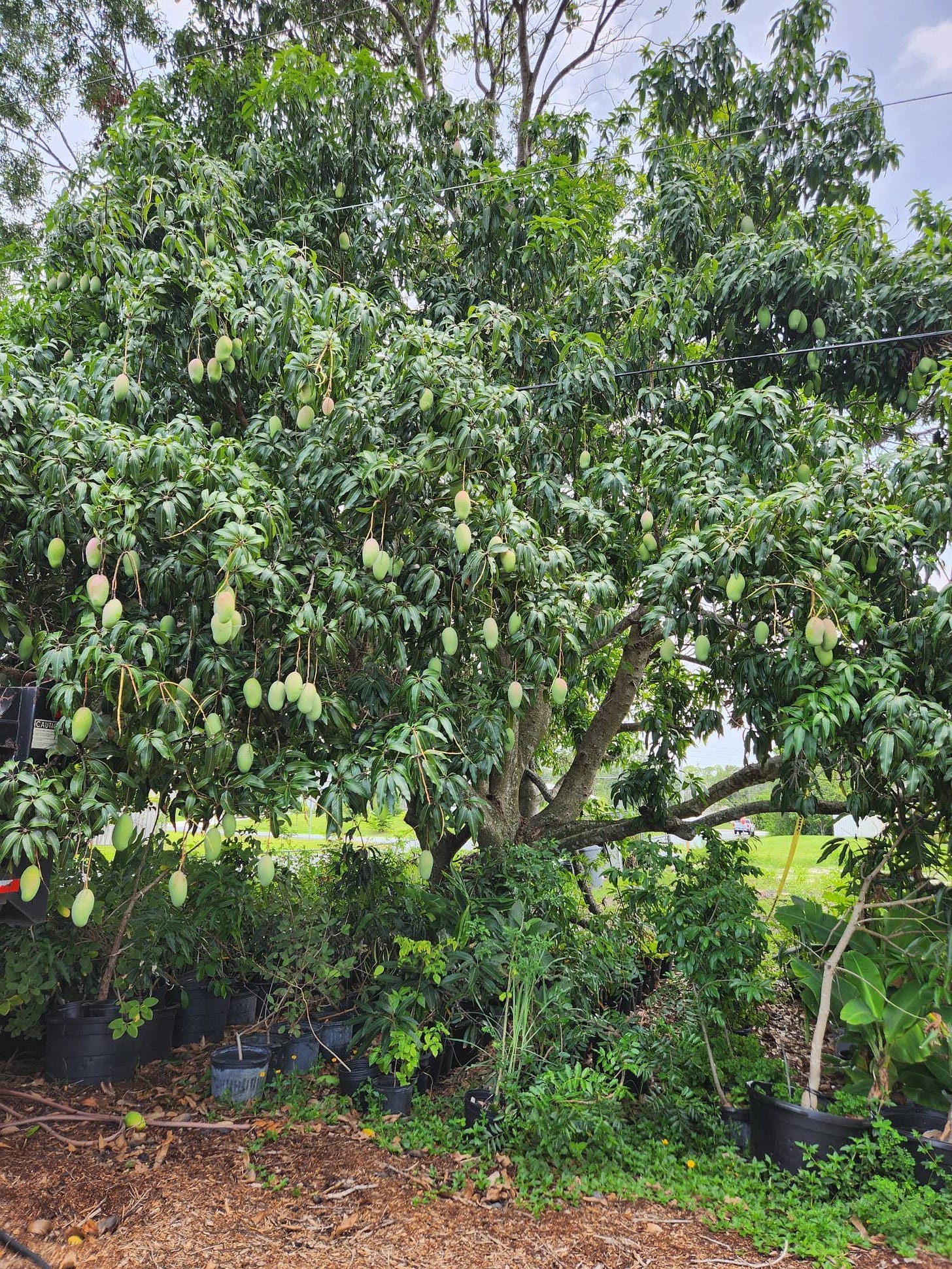Forget whatever you think you knew about farming in Florida.
This article is part of a series about Eco-Citizens in Florida, profiling the inspiring individuals and families who are experimenting, sharing, and re-thinking how we grow food. In doing so they are re-framing our culinary history. Meet Mario Reid of Shipwreck Eden who has navigated multiple challenges, growing, and innovating along the way. Shipwreck Eden is a family run tropical fruit tree nursery and farm in West Cocoa, Florida. Mario’s love of his fruit trees is a story of memory, culture, environmentalism, and the space where small-scale farming in Florida mingles with culinary history. The space where different cultures, growing food, culinary stories, and environmental education come together holds enormous human potential. It’s in this space that community and cultural connection can transcend the polarization Florida is known for. This is the space I want to write about. It is a space of potential and possibility.
When asked about the Mango, Mario’s eyes lit up. His first memories of them were climbing Mango trees in Paul Island, Jamaica. He shared “very fun” memories of his childhood, which he adds, “along with Mango trees, lots of sugar cane, Sweet Sop, Sour Sop, and Coconut trees.” His current trees include a Carabao Mango Tree, “…said to be the sweetest in the world.”, and then, “Maybe at one point it was but I don’t know if can boast such a title with all the new varieties available.”
For Mario, the Mango offers a point of entry and experimentation for culinary uses. He is a Veteran and received cooking and culinary training during his time with the Army. He describes the Mango like this, “The vibrant flesh offers a melt-in -your-mouth texture, bursting with sweetness and a rich aroma.”
Central Florida is known for unique growing conditions where subtropical and tropical food can be grown as well as crops from Asia, South and Central America, the Caribbean and Africa. Immigrant communities contribute heavily to the culinary story of Florida, where backyard fruit tree growers have shared food and recipes to benefit the culinary community, much like Mario.
What would you do if your business caught fire? Mario and his family had to rebuild after an electrical fire hit. The need to problem-solve did not end there. Mario shared that the rain hasn’t followed typical patterns this past season. Some of his harvest was lost when the fruit fell off too early. His family and his sister help with the labor that fruit trees require. The winds, the heat, and rain can be unrelenting. His mom recently joined them to pitch in. Mario credits his successes to his family and to mentorship. There is a community of other small-scale farms and fruit tree growers throughout the Space Coast and Florida. They all pitch in to help each other.
Like many fruit tree growers, Mario has several revenue streams. The model used is an integrated agribusiness: “We make fruit juices to encourage people to buy our trees.” Shipwreck Eden sells plants and fruit trees. Plants they sell have culinary, medicinal, and household uses from Cranbury Hibiscus to Aloe, and Shampoo Ginger. The fruit trees are integral to the business model. This includes custom grafted trees, Mulberry, Papaya, Guava, Sour Sop, June Plum, as well as Mango trees. Their website also lists the Turkey Berry Tree and says “Transform your meals with a traditional touch! Susumba’s unique bitter flavor adds depth to soups, stews, and sauces–– just like Grandma used to make.”
Shipwreck Eden is in the right place. Brevard County, on the East Coast of Florida, has unique agricultural history that ties into Mango lore, to botanical discoveries, and to the development of varieties that are commercially grown in other parts of the world. Driving around my own neighborhood in Merritt Island, you might see impromptu fruit stands and tables in the front yards giving away free backyard mangoes and starfruit. There are many places to learn about Mangos in the area. Mario and his sister, Keisha Sainfort, were vendors at the Harvest Festival in North Merritt Island this season. Mango trees are tropical and can grow in sandy soil, which is what yards like mine have. Driving around Central and South Florida, you will likely see many old Mango trees which have flourished with no care.
Brevard County and the habitat within it struggles with pollution and with water quality of the lagoon and rivers. It’s a longstanding problem that requires awareness and education. Shipwreck Eden recommends utilizing natural repellents, compost, and manures for backyard growers. They state, “We all share one plane of existence and were given one body to dwell in; it’s times we start living as such.” These stories are important to share in Florida. They show that a space full of connection and creativity exists through growing food, cooking, and environmental awareness.
Resources:
Please consider by plants, trees, juice, and other products from Shipwreck Eden. Find them at: www.shipwreckeden.com
Instagram: @shipwreckeden
University of Florida extension has online resources for growing Mango Trees in Florida.
Check them out:
Next week’s conversation and profile: Nick Finan is into “the sour stuff” and likes to “go full stop into his hobbies”. That’s how he wound up with 13,000 fruit trees. Check back to read more stories behind Central Florida’s inspiring edible landscapes.





